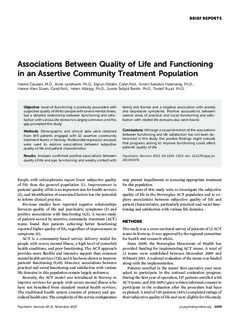Associations Between Quality of Life and Functioning in an Assertive Community Treatment Population
Journal article

Åpne
Permanent lenke
http://hdl.handle.net/11250/2498588Utgivelsesdato
2015Metadata
Vis full innførselOriginalversjon
Clausen, H., Landheim, A., Odden, S., Heiervang, K. S., Stuen, H. K., Killaspy, H., . . . Ruud, T. (2015). Associations Between Quality of Life and Functioning in an Assertive Community Treatment Population. Psychiatric Services, 66(11), 1249–1252. 10.1176/appi.ps.201400376Sammendrag
Objective:
Level of functioning is positively associated with subjective quality of life for people with severe mental illness, but a detailed relationship between functioning and satisfaction with various life domains is largely unknown, and this gap prompted this study.
Methods:
Demographic and clinical data were obtained from 149 patients engaged with 12 assertive community treatment teams in Norway. Multivariate regression analyses were used to explore associations between subjective quality of life and patient characteristics.
Results:
Analyses confirmed positive associations between quality of life and age, functioning, and weekly contact with family and friends and a negative association with anxiety and depressive symptoms. Positive associations between several areas of practical and social functioning and satisfaction with related life domains also were found.
Conclusions:
Although a causal direction of the associations between functioning and life satisfaction has not been determined in this study, the positive findings might indicate that programs aiming to improve functioning could affect patients’ quality of life.